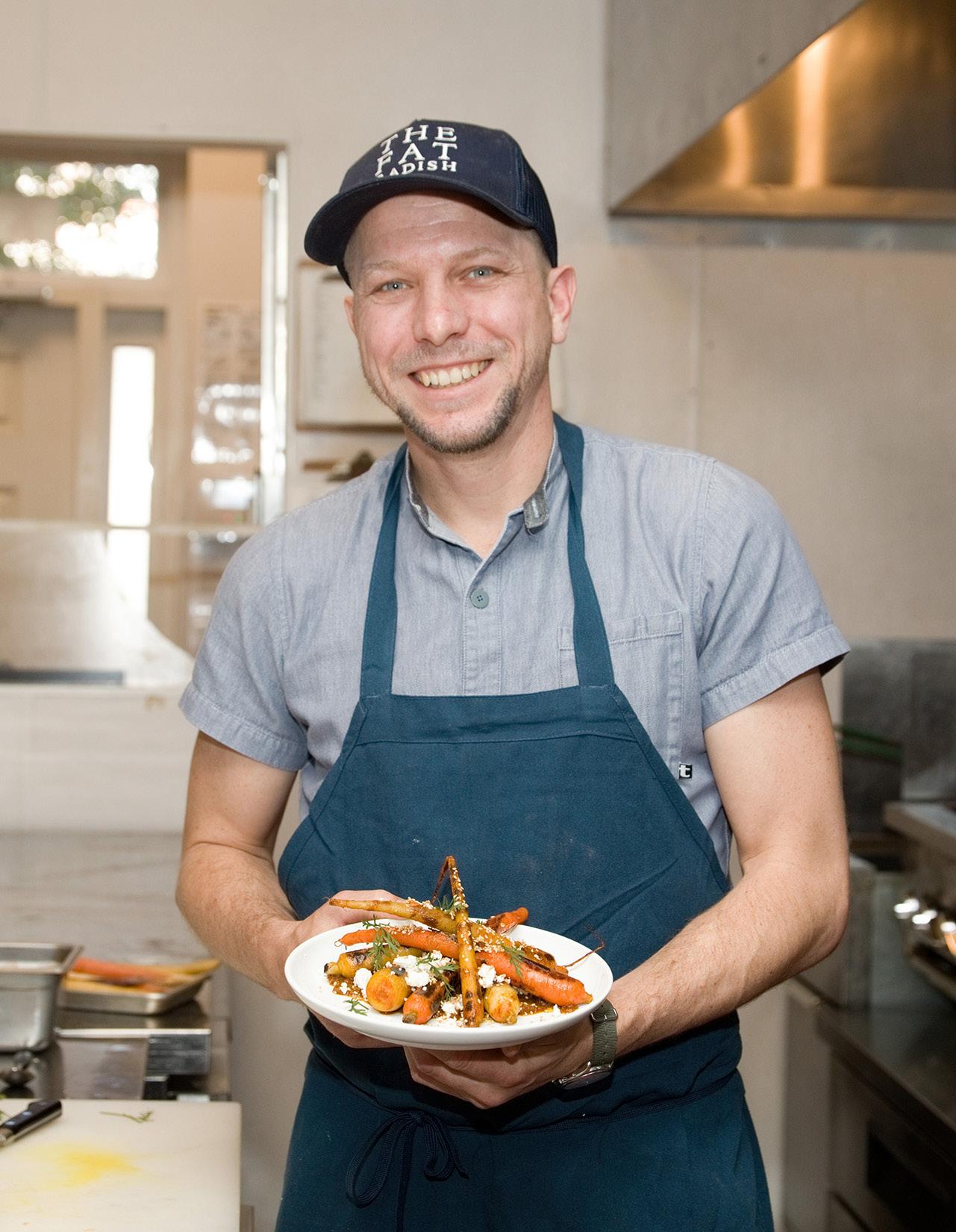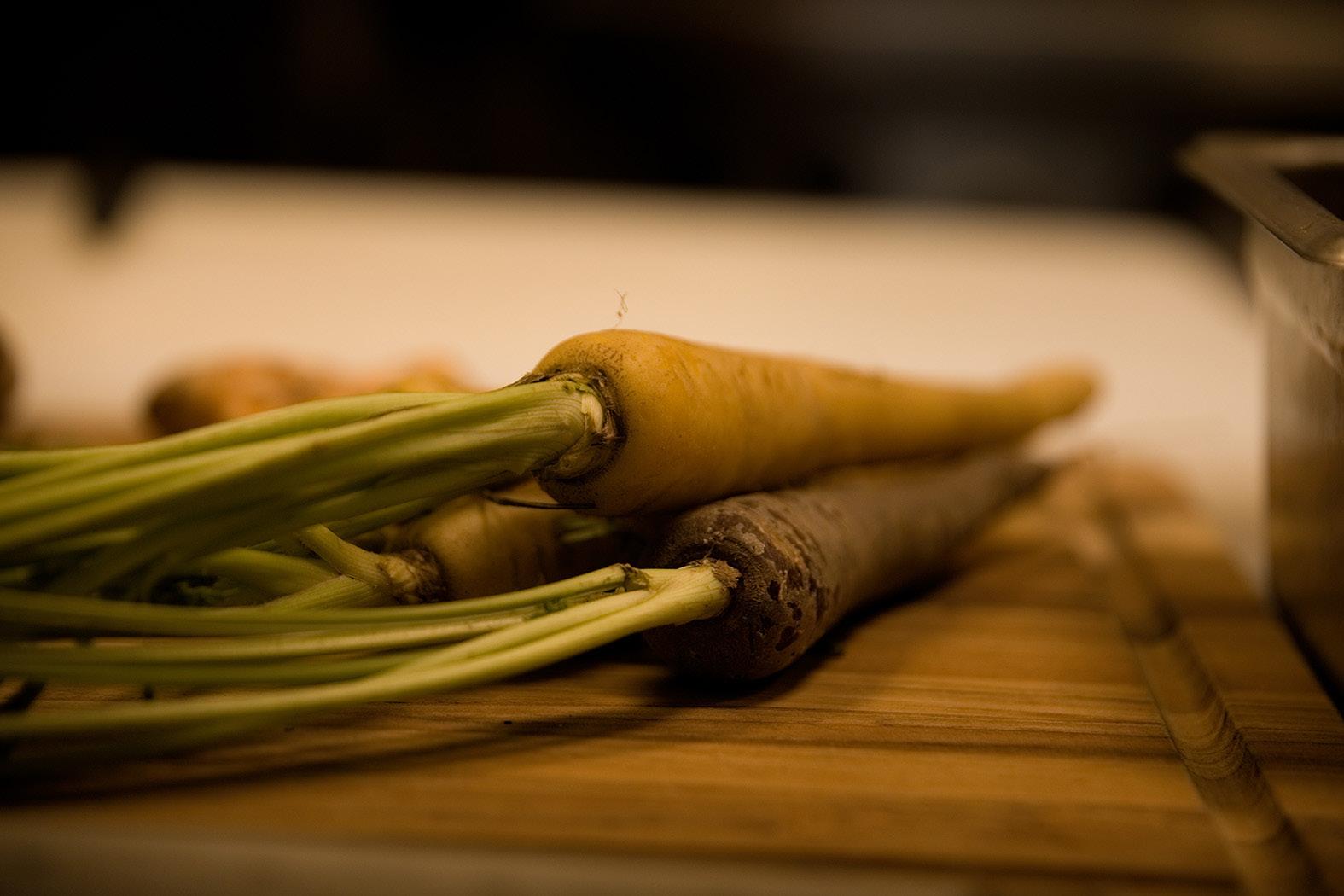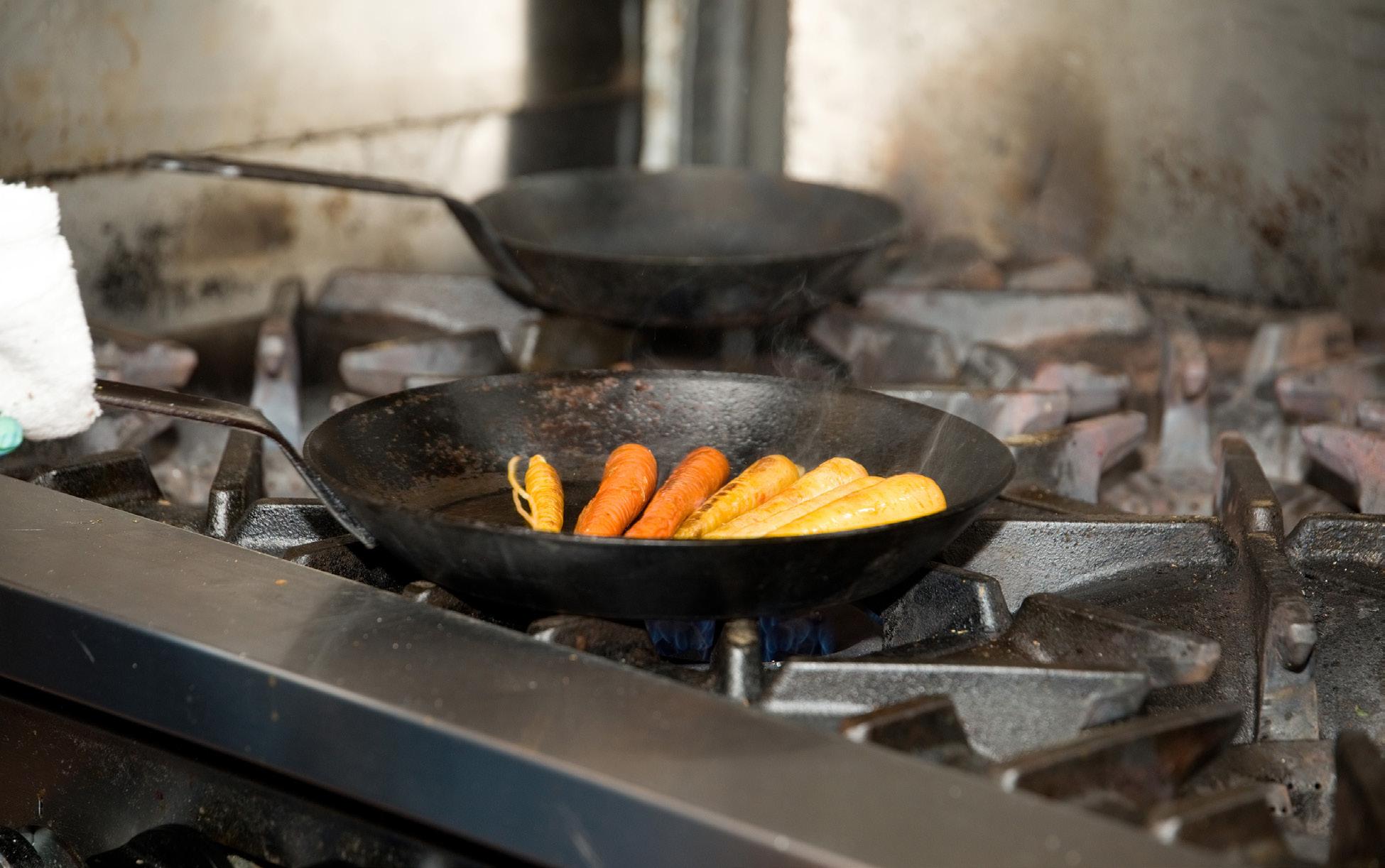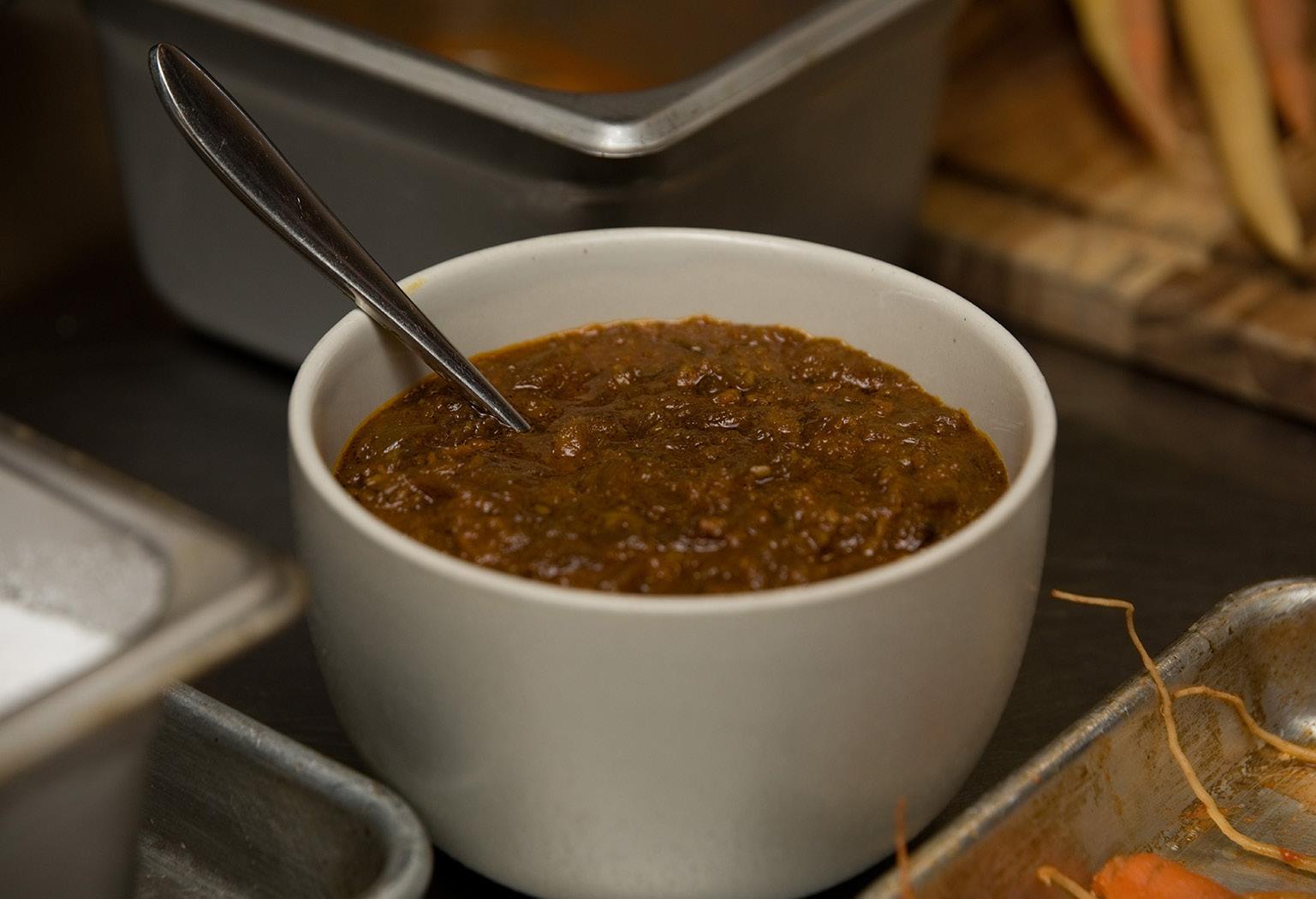
7 minute read
Chef Nicholas Wilber: Braised Carrots with Turmeric Chutney

Chef Nicholas Wilber: Braised Carrots with Turmeric Chutney Photos by Tara Ruby
Advertisement
by LeeAnna Tatum
Chef Nicholas Wilber, executive chef of The Fat Radish in Savannah, has a down to earth approach to food and an appreciation for quality, seasonal ingredients. Showcasing vegetables as the star of a meal is a big part of his repertoire.
“I grew up with European grandmothers,” Wilber reminisced, “one from England and one from Germany and they had really big gardens. Being an only child, I was at their houses all the time. I’d take a salt shaker with me and go out in the garden and pick a tomato off the plant and eat it … So, I was always drawn to that kind of thing.”
Wilber has been a chef for approximately 20 years, starting his career in his home state of Colorado. He fell in love with the lifestyle and the slightly dysfunctional family atmosphere of the professional kitchen. He chose to drop out of college and pursue his passion for cooking. Training under talented chefs, his culinary journey eventually took him to New York City and the world of fine dining and high end restaurants.
Eventually he tired of “tweezers and squirt bottles”, preparing perfectly plated foods only meant to be enjoyed on special occasions. He wanted to take that same commitment to quality, fresh ingredients prepared with care; but make it more accessible, more connected to community, and more educational for diners.

“It’s a lot nicer to be a chef in a more relaxed atmosphere, doing something positive for the community and enjoying what you do, instead of trying to do fine dining and make everything super fancy. That’s just not the kind of chef I wanted to be,” Wilber explained.
That opportunity came along when Wilber was asked to join the team opening The Fat Radish in New York City in 2010. Making connections with local farmers and sharing, not only their produce, but their stories as well, became a signature feature of the restaurant.

Chef Wilber believes that sharing the stories that connect diners to the source of their food is an important part of The Fat Radish’s success in New York and something he plans to continue in Savannah.

Wilber has been in Savannah for about a year preparing for the launch of a second The Fat Radish location which opened its doors six months ago. He is beginning the process again of making important connections to local farms and building a network from which to source ingredients. And though things are quite a bit different in Savannah than New York City, he’s okay with that.
“I’ve been in the South for a year and some change now. I love it,” Wilber said. “It’s nice … to live here, I can walk to work and it’s beautiful. To walk to work in New York is not very fun … Here you kind of slow down a little bit, enjoy your surroundings a bit more. On a personal level, that’s fun for me.”
Aside from the slower pace here in the South, Wilber has also been pleasantly surprised by the extended growing season and the kinds of foods that can be locally grown and sourced - things like ginger and turmeric. A second growing season for crops like carrots is another plus that makes shopping for ingredients a bit more interesting in the winter months than they were in New York.
Introduction to the recipe

When asked to share a recipe for our readers that could be included as part of a holiday menu, Chef Wilber, not surprisingly, chose to highlight a vegetable. His recipe for Braised Carrots with Turmeric Chutney celebrates the earthiness of the carrot while bringing out its natural sweetness as well. This recipe utilizes two main ingredients, the carrot and turmeric, that can be readily sourced here locally.
“The way we do things here (at The Fat Radish) is to showcase a vegetable, we’ll add things here and there,” Wilber explained, “but this dish is just carrots on the plate with a really nice chutney that plays off the sweetness of the carrots and the earthiness.”
“We like to showcase a vegetable in their peak season and carrots do well in the fall. They really need that cold weather so the sugar content goes up. I’m just starting to see them come around again. Which is amazing that you get two growing seasons around here … i love that.”
“There are things that grow here that I was shocked about, like fresh turmeric. So, it just made sense to make a really nice chutney with turmeric. To highlight the carrots and then all the sweetness gets knocked down with a really good goat cheese (we get it from Bootleg Farms). We used feta on this dish because it’s kind of salty and balances the whole dish out.”

Recipe Turmeric Honey Chutney
Yields 1 quart

6 oz Fresh Turmeric, 4 oz. Fresh Ginger, 4 Medium White Onions, 6 Garlic Cloves, 3 Tbs Tangier or Yellow Curry Spice, 1 Tsp Red Chili Flakes, 1 Cup Honey, 6 Cups Carrot Juice, 1/4 Cup Cooking Oil • Peel and mince turmeric, ginger, and garlic • Peel onions and dice small • In a large saucepan heat oil and sweat onions, garlic, ginger, and turmeric till soft • Add dried spices and toast in oil till fragrant ( about 5 minutes) stirring and making sure it does not burn on bottom of pan • Add honey and caramelize lightly • Add carrot juice and turn pan down to a low simmer and reduce for 45 minutes to an hour until if forms a jammy consistency • Remove from pan and cool • Store in an airtight container in the refrigerator

Our advertisers make it possible for us to share the stories of our local, sustainable food movement!
Recipe Braised Carrots
Yields 10 Servings

6 Pounds Carrots (thin rather than fat ones), 2 Inch Piece of Fresh Ginger, 1 Cup Orange Juice, 2 Bay Leaves, 6 Cups Carrot Juice, Turmeric Honey Chutney (see recipe above), Crumbled Goat Cheese, Fresh Basil or Cilantro, and Toasted Sesame Seeds for Garnish • Thoroughly clean carrots with a scrub brush and warm water paying attention to the top ridge where dirt hides • Place first 5 ingredients in braising pan and simmer till carrots are just tender • Remove carrots and cool on sheet pan in refrigerator until ready to serve • Reduce remaining liquid by half and set aside • Heat a large saute pan on high with a little cooking oil • Add carrots and reduce heat to medium high. Gently roll carrots in pan till the skin starts to caramelize to a golden brown. You’ll need to work in batches. • Remove from heat and add ¼ cup of the carrot braising liquid. Note that it will be very bubbly and you want to do this away from the heat to not cause a flare up. • Return to heat and reduce the liquid till a nice glaze is formed around the carrots • Place a good dollup of the chutney on a plate and arrange the carrots on top • Crumble some goat cheese on top and a good amount of toasted sesame seeds • Garnish with basil or cilantro
Tips from Chef Nicholas
Make a recipe your own: “you should always do your own little spin”.
Don’t stress: “I always say, don’t stress out too much ... cooking is supposed to be enjoyable … Don’t shoot for perfection, just enjoy it.”
Chutney keeps: “it will last forever as long as you keep it in a sealed container in the fridge, you can keep it for six months. You can add it to any dish. It would go good on a piece of chicken, you can add it to rice. It just goes great with cheese … Over the holidays, people come over, you can get a little brie, get the chutney out and it’s good to go.”
Use it all: “If you get really nice carrots, you can save the carrot greens and do all kinds of things with them. You can make pestos with them and salsa verdes as well. The stems are totally edible as well. It’s nice to leave them on, especially when braising, because you can tell - that’s a carrot!”
Bring out the natural sugars: “The reason for (braising) is there’s lots of sugars in the carrot and orange juice and that imparts into the carrots. Which is nice because when we pick them up, we’ll saute them and caramelize those and it adds that great sweetness. That part’s super exciting.”
Broil or saute: For the final step of the cooking process, you can broil all the carrots in a pan rather than cooking them in smaller batches on the stove. “You can just pop the carrots in the oven and broil them, here we do it per order. Broil them at a high temperature to caramelize.”








